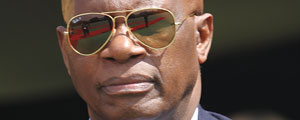
FINANCE minister Patrick Chinamasa last week admitted that international financiers and other countries were reluctant to offer credit lines to Zimbabwe due to its bad debt record. OWN CORRESPONDENT
Speaking in Bulawayo last week, Chinamasa said the country was failing to access new financing which was critical for revival of the economy because it was in arrears in servicing its external debt.
“No one wants to lend Zimbabwe money anymore because we have defaulted in the past. Whether we go to Zambia or to Malawi, it’s the same thing because we are indebted to these countries. We are on our own and we have to be more innovative,” said Chinamasa at the Zimbabwe International Trade Fair business conference.
He also said mobilising resources had become a challenge even from institutions such as the International Monetary Fund (IMF) as the country owed it a billion dollars.
“We are a member of the IMF, but we cannot borrow because we are in arrears. We have arrears to the Bretton Woods institutions to the tune of US$1 billion or so. We can’t access the benefits of membership until we have cleared the arrears,” said the minister.
“There is a common misunderstanding that each time I am going out, I am looking for money. I am actually going there trying to arrange how to pay the arrears. We have to talk to China, India, Kuwait, the Paris Club creditors on how to service the loans so that we can get new lines of credit. Everywhere I go I am being asked about the payment plan and I don’t quite enjoy that question.”
He said no one was directly lending Zimbabwe.
“The funders or international financial institutions from Europe or America are doing it indirectly through institutions in South Africa and when they realise that the money is going to Zimbabwe, these institutions put a 5% or 6% mark-up which they call country risk mark-up,” said Chinamasa.
- Chamisa under fire over US$120K donation
- Mavhunga puts DeMbare into Chibuku quarterfinals
- Pension funds bet on Cabora Bassa oilfields
- Councils defy govt fire tender directive
Keep Reading
Zimbabwe’s external debt is said to be over US$6 billion. Chinamasa said there was need to start creating a new track record that would enable the country to borrow and repay its debts.
He said the economy was in a deplorable state, but was not aware what had caused it to be in that poor condition.
“These are the questions that I am still trying to answer as well as what has caused the liquidity crisis. If I get an honest answer to that, then I will be able to find the solution,” he said. “If it is political, then the solution must be political; and if it is economic, then the solution must be economic. But, to be honest, I am still grappling to understand what has caused the liquidity crisis in the country.”
Chinamasa said one reason why the economy was in the doldrums was because of the cost structure.
“We are supposed to compete with China, but an average worker in China is getting about US$100-US$150 (salary per month), but here we are talking of US$300-US$500. Workers there work 24 hours, but here it’s six hours,” he said.
Chinamasa said there was need to capitalise local banks, especially those owned by indigenous people, so that they could be able to offer lines of credit to local industries.











